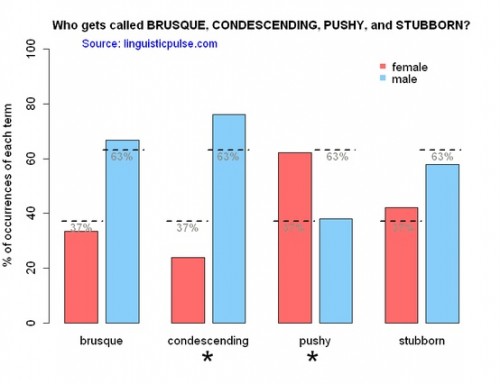According to data gathered from the Corpus of Contemporary American English by linguistics PhD student Nic Subtirelu, women are called “pushy” twice as often as men, while men are more likely to be described as “condescending.”
At his blog, Linguistic Pulse, Subtirelu argues:
Condescending seems to differ from pushy and bossy in an important way, namely that it seems to acknowledge the target’s authority and power even if it does not fully accept it.
Subtirelu has also ran the numbers for “bossy” and found that it was used to described women 1.5 times more often than men.
Lisa Wade, PhD is an Associate Professor at Tulane University. She is the author of American Hookup, a book about college sexual culture; a textbook about gender; and a forthcoming introductory text: Terrible Magnificent Sociology. You can follow her on Twitter and Instagram.

Comments 8
Bill R — June 21, 2014
You're walking us down the garden path in a really weird way with this one. So I'm calling bullshit; I'm not buying the connection between the data and your headline.
Andrew — June 21, 2014
The post rightfully acknowledges that the use of the word "condescending" implies that the subject has some degree of power and authority. But at the same time, quite the opposite is true for "bossy," which strongly implies that the subject is not actually a boss. (It would be like describing The Trial as Kafkaesque).
This seems likelier to be an effect of the gender imbalance in positions of power than a cause of it.
shorelines — June 22, 2014
How much productivity is lost when women managers have to constantly self-sensor and re-frame their directions to avoid being viewed as pushy/bossy? I know I spend A LOT of time crafting requests so as not to offend.
Week in Review | Masculinities 101 — June 22, 2014
[…] a great discussion about friendship, specifically the importance of men having women as friends. At Sociological Images, Lisa Wade explores the words used to police women who refuse traditional female deference. And, at […]